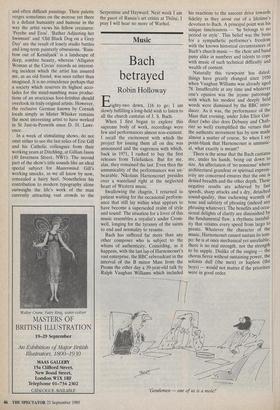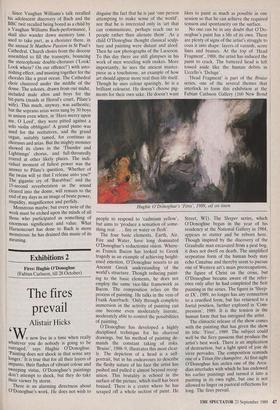M usi c
Bach betrayed
Robin Holloway
Eighty-two down, 116 to go; I am slowly fulfilling a long-held wish to listen to all the church cantatas of J. S. Bach.
When I first began to explore this supreme body of work, recordings were few and performances almost non-existent. I recall the excitement with which the project for issuing them all on disc was announced and the eagerness with which, back in 1971, I rushed to buy the first releases from Telefunken. But for me, alas, they remained the last. Even then the unmusicality of the performances was un-' bearable. Nikolaus Harnoncourt presides over a wasteland right at the neglected heart of Western music.
Swallowing the chagrin, I returned to patient waiting for the occasional perform- ance that still lay within what appears to have become a superseded realm of style and sound. The situation for a lover of this music resembles a royalist's under Crom- well, longing for the tyranny of the saints to end and normality to resume.
Bach has suffered far more than any other composer who is subject to the whims of authenticity. Coinciding, as it happens, with the last lap of Hamoncourt's vast enterprise, the BBC rebroadcast in the interval of the B minor Mass from the Proms the other day a 39-year-old talk by Ralph Vaughan Williams which included his reactions to the nascent drive towards fidelity as they arose out of a lifetime's devotion to Bach. A principal point was his unique timelessness — 'he belongs to no period or style'. This belief was the basis for a sympathetic performer's freedom with the known historical circumstances of Bach's church music — the choir and band puny alike in numbers and talents to cope with music of such technical difficulty and wealth of content.
Naturally this viewpoint has dated: things have greatly changed since 1950 when Vaughan Williams was already aged 78. Insufferable at any time and whatever one's opinion was the jejune patronage with which his modest and deeply held words were dismissed by the BBC intro- ducer. As it was, the performance of the Mass that evening, under John Eliot Gar- diner (who also does Debussy and Chab- rier so well) exemplified the virtues that the authentic movement has by now made almost a matter of course. So when I say point-blank that Harnoncourt is unmusic- al, what exactly is meant? There is the sense that the Bach cantatas are, under his hands, being cut down to size. An affectation of `no nonsense' where architectural grandeur or spiritual express- way are concerned ensures that the one is denied breadth and the other depth. These negative results are achieved by fast speeds, sharp attacks and a dry, detached sound-quality, thus eschewing warmth of tone and subtlety of phrasing (indeed any phrasing whatever). The benefits and occa- sional delights of clarity are diminished by the fundamental flaw, a rhythmic instabil- ity that vitiates every speed from largo to presto. Whatever the character of the music, Hamoncourt cannot sustain its tem- po: he is at once mechanical yet unreliable; there is no real strength, nor the strength to be supple. Dislike of the singing — the chorus fierce without sustaining power, the soloists dull (the men) or hapless (the boys) — would not matter if the priorities were in good order.
'Gentlemen — one of us is a mole!' Since Vaughan Williams's talk recalled his adolescent discovery of Bach and the BBC twit recalled being bored as a child by a Vaughan Williams Bach-performance, I shall also wander down memory lane. I used to take part, as a chorister there, in the annual St Matthew Passion in St Paul's Cathedral. Church choirs from the diocese assembled to fill the transepts, bouncing the stereophonic double-choruses (`Look! Look where? On our offence!') with asto- nishing effect, and massing together for the Chorales like a great ocean. The Cathedral choir clustered under the middle of the dome. The soloists, drawn from our midst, included male altos and boys for the bit-parts (maids at Herod's court, Pilate's Wife). This much, anyway, was authentic; but the soprano arias were sung by 30 boys ln unison even When, in 'Have mercy upon me, 0 Lord', they were pitted against a solo violin obbligato! A grand piano was used for the recitatives, and the grand Organ, suitably tamed, for continuo in Choruses and arias. But the mighty monster showed its claws in the 'Thunder and Lightnings' chorus, and full-throatedly roared at other likely places. The indi- vidual moment of fullest power was the answer to Pilate's question, 'Whether of the twain will ye that I release unto you?' The gigantic cry of `Barabbas!' and the 15-second reverberation as the sound Cleared into the dome, will remain to the end of my days as an image of brute power, stupidity, magnificence and perfidy.
Monstrous maybe; but every note of the work must be etched upon the minds of all those who participated as something of enormous significance and value. What Harnoncourt has done to Bach is more monstrous: he has drained this music of its meaning.



























































 Previous page
Previous page